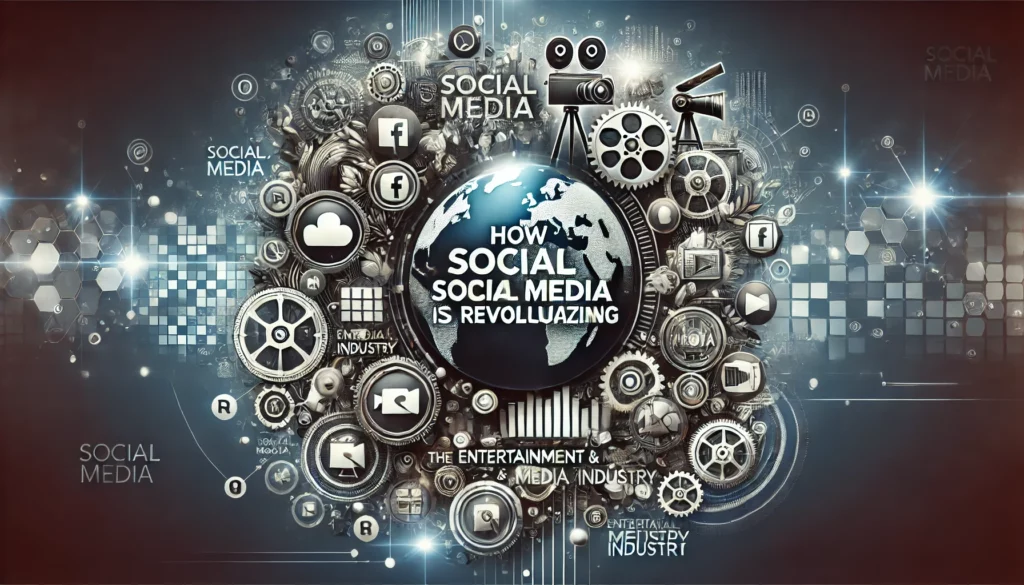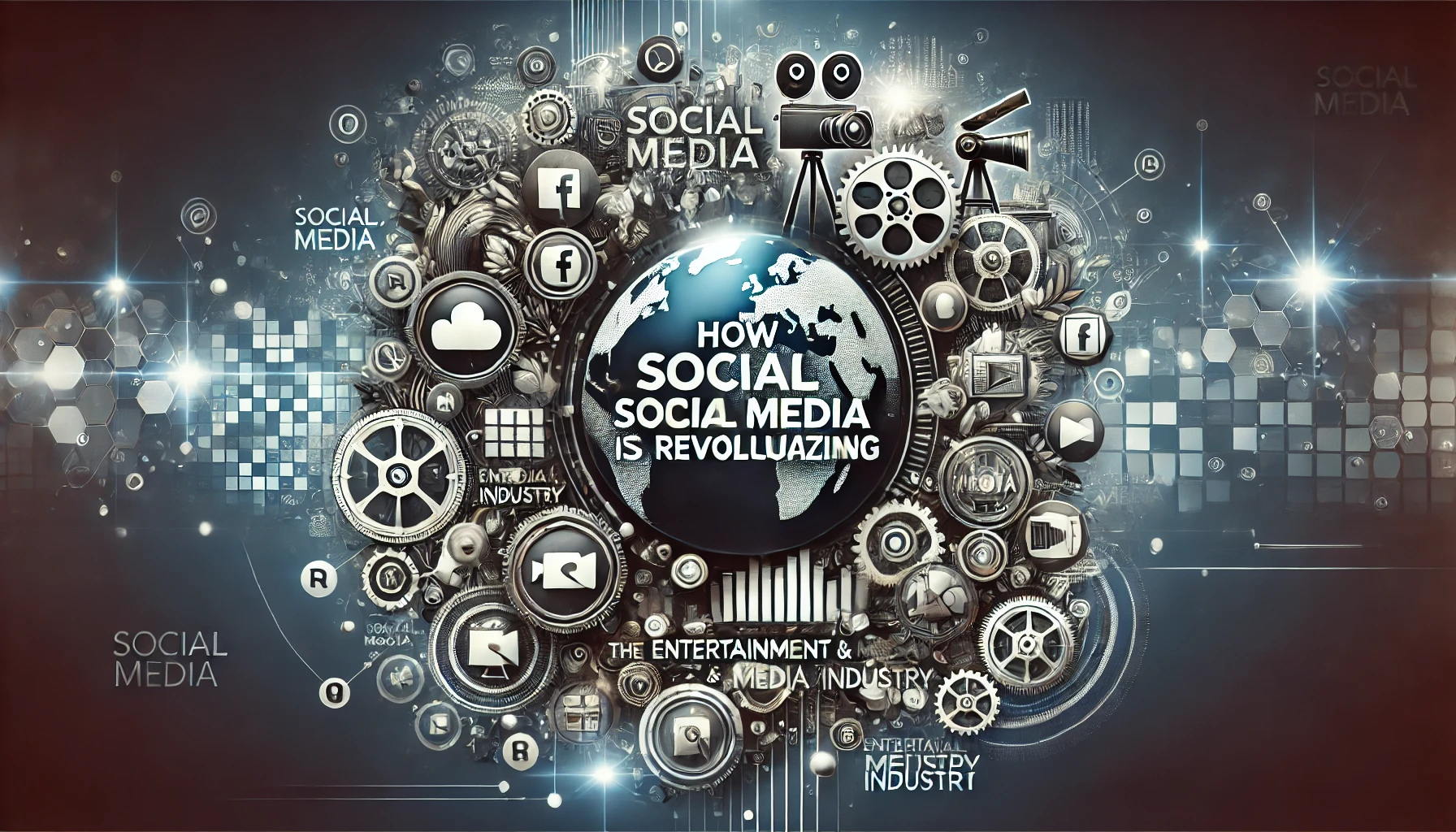
In today’s fast-paced digital world, social media has become more than just a platform for connecting people; it’s a driving force in reshaping industries worldwide. One sector that’s been significantly impacted is the entertainment and media industry. But how exactly is social media revolutionizing this space? From content creation to distribution, social media is altering how we engage with media, consume entertainment, and even how advertisers reach their audiences. In this article, we’ll dive into the ways social media is transforming this dynamic industry.
1. The Rise of Social Media Platforms as Content Creators
Social media platforms like YouTube, Instagram, TikTok, and Twitter have evolved from social networking sites to powerful content creation hubs. What was once primarily a space for sharing personal updates has now turned into a place for producing, showcasing, and monetizing content.
1.1 A New Era of Content Creation
Social media has democratized content creation. Now, anyone with a smartphone can be a filmmaker, influencer, or musician, producing content that can potentially go viral. Platforms like TikTok have given rise to new forms of content, such as short-form video, which is now a dominant trend in the entertainment world. With easy-to-use editing tools and real-time engagement features, content creators can reach millions of people without traditional gatekeepers.
1.2 User-Generated Content and Its Influence on Media Trends
Gone are the days when traditional media outlets dictated entertainment. Now, the audience shapes what’s popular. User-generated content, especially on platforms like Instagram and TikTok, has the power to dictate trends in fashion, music, and even film. This shift has given rise to new stars, content formats, and genres that were previously overlooked by mainstream media.
2. The Evolution of Social Media as a Distribution Channel
Social media platforms have not only become creators but have also redefined how content is distributed. Traditionally, media companies relied on TV networks, movie theaters, and radio stations to broadcast content. Today, social media has become a central distribution channel.
2.1 Immediate and Global Reach
With billions of active users across the globe, Platforms offer unparalleled reach. Content can now go viral in a matter of hours, with shares and likes driving exposure far beyond the initial audience. The ability to reach a global audience without the need for expensive marketing campaigns or physical distribution is a game-changer for creators and media companies alike.
2.2 Targeted Advertising and Custom Content
Allows advertisers to target specific demographics based on interests, behavior, and location. This ability to reach niche audiences with tailored advertisements has transformed the way brands engage with consumers. Media companies now use social media not just for distributing content but also for gathering valuable data to personalize experiences and advertisements.
3. The Shift to Interactive and Engaging Media
Has changed the way audiences interact with entertainment and media. Unlike traditional media, where consumers were passive recipients, social media encourages active participation.
3.1 Real-Time Interaction with Celebrities and Influencers
Platforms have brought fans closer to celebrities, influencers, and creators. Through live streams, Q&A sessions, and comments, audiences can engage with their favorite stars in real-time. This creates a more personal connection and enhances fan loyalty, making entertainment more immersive.
3.2 User Feedback and Influencer Marketing
Engagement doesn’t stop at comments or likes. Allows users to provide direct feedback on content, which is invaluable for creators and brands. Influencers, who have a strong social media presence, play a pivotal role in shaping public opinion, promoting products, and even launching entertainment projects. Their ability to connect with audiences on a personal level makes them powerful marketing tools.
4. Social Media as a Hub for Live Streaming and Digital Events
Live streaming has become one of the most significant innovations in the entertainment industry. Platforms like Facebook, YouTube, and Instagram offer live streaming features that allow users to broadcast events in real time, creating an interactive experience that traditional media cannot match.
4.1 Virtual Concerts and Events
In recent years, we’ve seen a surge in virtual concerts and events streamed on platforms like Instagram Live, YouTube, and Twitch. Artists and creators use these platforms to engage with their fanbase directly, perform live, and even sell tickets or merchandise during the stream. This trend accelerated during the COVID-19 pandemic but has continued to thrive as fans appreciate the convenience and immediacy of live-streamed content.
4.2 Interactive and Immersive Content
Platforms like Twitch and YouTube have created ecosystems where gamers, influencers, and celebrities can live stream their activities while engaging with viewers. This has led to a more immersive and interactive form of entertainment that allows fans to participate in the content, making them feel like they are part of the action.
5. The Growing Role of Social Media in Film and Television
Social media’s influence on the film and television industry cannot be overstated. From casting announcements to trailers, behind-the-scenes looks, and fan interactions, social media is an essential tool for media companies.
5.1 Viral Marketing and Movie Promotion
Gone are the days when a movie trailer was the sole tool for promotion. Now plays a crucial role in building hype around upcoming movies and TV shows. Through teaser trailers, countdowns, and fan engagement, studios create buzz that can directly translate into box office success.
5.2 Social Media Campaigns and Cross-Promotions
Film studios and TV networks collaborate with influencers to promote movies and shows, often launching exclusive content and sneak peeks for their followers. This cross-promotion ensures that content reaches the right audience and creates anticipation before the official release.
6. Social Media’s Impact on Music Industry
The music industry has also felt the tremors of social media’s revolution. Platforms like Spotify, Apple Music, and YouTube have reshaped how music is consumed, while platforms like TikTok have become launchpads for viral songs.
6.1 Viral Music Trends and Challenges
TikTok, in particular, has had an undeniable impact on the music industry. Songs that go viral on the platform often see a spike in streams on platforms like Spotify and Apple Music. Trends, such as dance challenges and viral memes, create a cycle where music and social media continuously fuel each other’s success.
6.2 Direct Fan-Artist Interaction
Allows musicians to interact directly with their fans. Artists can share personal moments, new music, and behind-the-scenes content in real-time. This interaction builds a stronger fan base and creates a more loyal following.
7. Social Media’s Influence on Traditional Media Outlets
Traditional media outlets are also adapting to the rise of social media. Networks, newspapers, and even radio stations are incorporating social media into their strategies to stay relevant in a fast-evolving landscape.
7.1 Social Media as a News Source
Platforms have become primary news sources for many people. Breaking news often spreads first on Twitter or Facebook before making it to television broadcasts. This shift has led traditional media outlets to adapt, often turning to social media to verify stories and reach a broader audience.
7.2 The Importance of Social Media Presence for Traditional Media
Traditional media outlets now maintain active social media profiles to engage directly with their audiences, post updates, and build communities. This integration ensures that they remain competitive in an era where digital-first content is king.
Conclusion
The revolution brought about by social media in the entertainment and media industry is undeniable. From content creation and distribution to marketing, live streaming, and audience interaction, platforms have redefined the way we engage with entertainment. As continues to evolve, it’s clear that the future of the media and entertainment industries will be increasingly shaped by these platforms. The relationship between social media and media companies will only grow stronger, offering new opportunities for content creators, advertisers, and consumers alike.
Frequently Asked Questions
1. How has social media changed the way we consume entertainment?
Has made entertainment more interactive and accessible, allowing users to engage directly with content and creators in real-time.
2. How can influencers impact the entertainment industry?
Influencers have a direct connection with their audience, which allows them to shape public opinion and promote media projects in a personal, engaging way.
3. What role does social media play in film promotion?
Helps generate buzz around movies and TV shows through trailers, exclusive content, and fan interactions, leading to increased anticipation and box office success.
4. How do live streaming and digital events impact the entertainment industry?
Live streaming allows for real-time engagement with fans and has become a vital tool for artists, musicians, and content creators, making entertainment more immersive.
5. Why are traditional media outlets embracing social media?
To stay competitive, traditional media outlets use social media to broaden their reach, engage with audiences, and stay relevant in a digital-first world.
Read More :
